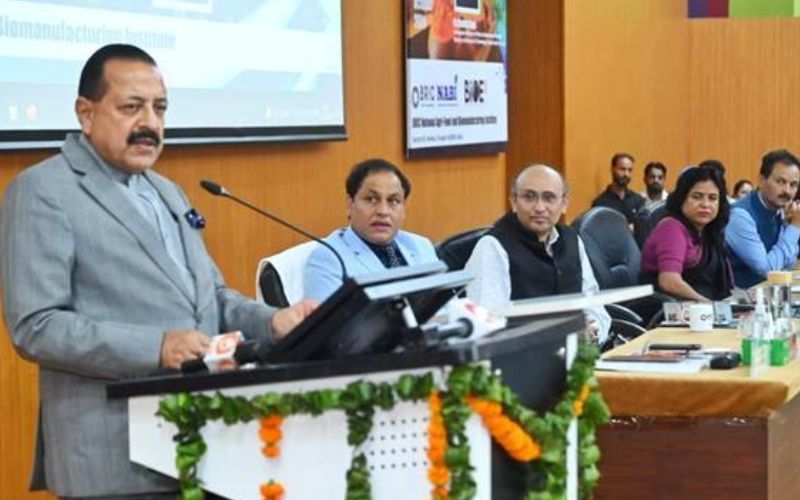“India is among the first nations to implement an exclusive biotechnology policy. This shift will propel a significant transformation from traditional manufacturing to synthetic production through sustainable, eco-friendly solutions that rely on modern, cost-effective technology.” Dr. Jitendra Singh
Dr. Jitendra Singh, Union Minister of State (Independent Charge) for Science and Technology, Earth Sciences, PMO, Atomic Energy, Space, and Personnel, Public Grievances and Pensions has recently inaugurated the new complex of India’s first Biomanufacturing Institute, “BRIC-National Agri-Food Bio-Manufacturing Institute” (BRIC-NABI) aimed at enhancing India’s agri-food sector through advanced biotechnology.
Addressing the assembly of scientists, industry leaders, and stakeholders, the Minister emphasized the government’s dedication to fostering innovation in agriculture, creating job opportunities, and promoting environmental sustainability—essential elements in achieving Prime Minister Narendra Modi’s vision of “Viksit Bharat”.
During the inauguration, Dr. Jitendra Singh underscored the Modi government’s robust prioritization of science and technology, referencing recent landmark decisions such as the newly launched BioE3 policy. This initiative, which stands for biotechnology in the service of the economy, employment, and the environment, exemplifies the administration’s focus on fostering a high-impact science sector. “Biotechnology and synthetic production will not only transform agriculture but redefine India’s role in global scientific advancements,” stated the Minister.
In his address, Dr. Jitendra Singh noted that India is among the first nations to implement an exclusive biotechnology policy. This shift, he emphasized, will propel a significant transformation from traditional manufacturing to synthetic production through sustainable, eco-friendly solutions that rely on modern, cost-effective technology. The Minister lauded India’s rapid rise from “fragile five” to “first five” in global economic standing, crediting this progress to the government’s science-focused strategy.
The BRIC-National Agri-Food Biomanufacturing Institute (BRIC-NABI), formed through the strategic merger of NABI and CIAB, is poised to transform India’s agricultural landscape by uniting biotechnology and bioprocessing expertise. This newly established entity aims to streamline the journey from research to commercialization, facilitating pilot-scale production and delivering innovative agri-tech solutions to the market.
Dr. Jitendra Singh highlighted that this consolidation would drive efficiency in agricultural R&D, paving the way for high-yield, disease-resistant crops, biofertilizers, and biopesticides. These advancements not only align with the government’s ambition to double farmers’ incomes but also promote sustainable, eco-friendly practices, creating new income avenues for farmers and supporting broader environmental objectives.
A significant highlight was the establishment of the BioNest Incubation Centre, designed as a collaborative hub for industry partnerships, innovation, and public-private initiatives to nurture startups. The BioNEST BRIC-NABI Incubation Center aims to empower local youth, women, and farmers by supporting startups in agriculture, food, and bioprocessing, bridging research with industry for faster commercialization of agri-food innovations.
Through joint efforts with both public and private sectors, the Minister said, BioNEST strives to drive inclusive economic growth, aligning with the “Make in India” vision and advancing India’s journey toward self-reliance. Dr. Jitendra Singh emphasized the need for active private sector involvement, noting that investment in such incubators can unlock market potential and provide sustainable employment for India’s young workforce.
In line with its mission to advance biomanufacturing, Dr. Jitendra Singh announced the Biomanufacturing Workshop 1.0, set to take place in December 2024. This pioneering workshop will delve into biomanufacturing’s applications across agriculture, food, pharmaceuticals, and energy, offering insights into cutting-edge techniques that harness biological systems for sustainable production.
Aimed at researchers and industry professionals, this event supports the government’s BioE3 policy and reflects India’s commitment to eco-friendly, innovation-driven industrial growth, the Minister noted.
Dr Jitendra Singh also addressed the brain drain of Indian scientists, encouraging young talent to pursue research and entrepreneurship within India, emphasizing the country’s competitive resources and a growing scientific ecosystem that rivals global institutions. This national focus on developing indigenous expertise, he believes, will strengthen India’s global influence in science and innovation.
The establishment of the BRIC-National Agri-Food Bio-Manufacturing Institute marks a pivotal step in India’s journey toward an integrated, science-powered economy, aligned with the Modi government’s ambitious development goals. Through initiatives like BioE3 and BioNest, India positions itself not only as a knowledge leader but as a dynamic incubator of innovation that is ready to contribute to sustainable growth worldwide. Dr. Jitendra Singh’s message was clear: the advancement of India’s agri-food sector will be pivotal to building a resilient, forward-thinking nation.
Source: PIB

